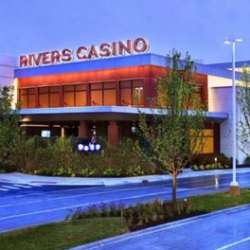Gross revenues for New York’s newest land-based gaming venue, Rivers Casino & Resort Schenectady, have been disappointing in the 7 months since it opened. Despite concerns by local residents, longtime casino supporters like Assemblyman Angelo Santabarbara say Rivers Casino will reach expectations.
Developers told the New York State Gaming Commission they expected Rivers casino to make $223 million in gross gaming revenue. The figures are nowhere near that amount in the first seven months of operation.
Over a 7-month period from February to August, Rivers Casino generated $82 million in gross revenue. That means a bit less than $12 million a month in gross revenues. Projection previous totals over a year, Rivers Casino is expected to make $140.57 million by the start of February 2018 — only about two-thirds of the projected third year earnings.
Santabarbara: “The Best Is Yet to Come”
New York State Assemblyman Angelo Santabarbara urges patience from those who expected more. Santabarbara said, “Over time, I think that they will reach those projections. The best is yet to come.”
“We’re going to see more jobs; we’re going to see more investment. When you drive out of here if you look down the road you will see projects that are taking place now because of this site.”
Shortfall Based on 3rd-Year Projections
Comparing first-year returns against third-year projections is somewhat unfair. If one were discussions a brand new casino on the Las Vegas Strip, that might not be the case. When one is talking about casino development in Schenectady, it is a different manner.
How Casinos Help a Local Economy
The idea behind Rivers Casino the three other new casinos licensed by the New York State Gaming Commission three years ago was to rejuvenate the economies in Upstate New York communities which needed help. Part of the appeal of a casino development was to spur investments in nearby real estate — in businesses which would receive more traffic from the existence of a casino nearby.
Such business activity is a two-way street. As the nearby community receives more business development, it creates more permanent and temporary jobs. It requires that developers build residential areas. Some of those businesses also attract more gamblers to the area, as it becomes more of a vacation destination.
NYS Assemblyman: “Putting Our Community First”
Santabarbara described the positive effects the construction of the Rivers Casino already has created. He said, “The construction jobs alone, more than a million man-hours have been put into this site. Those construction jobs alone have supported local families, regional families. You’ve got to give it time because I think they are putting our community first. You will see that the investment is something that is significant.”
The residential-retail building project has been massive to this point. Rivers Casino cost $480 million and includes a casino, two hotels, condominiums, apartments, retail and office space, and a marina.
Currently, Rivers Casino employs between 900 and 1000 staff members at any given time. Eventually, the casino’s executives expect to have a workforce of 1100 permenent workers.
Casinos Build a Customer Database over Time
A newly opened gaming venue like Rivers Casino builds its revenue streams incrementally, because new operations need to build a local customer database. The casino is owned by Rush Street Gaming of Chicago and Galesi Group of Rotterdam.
While Rush Street Gaming has casinos in Pittsburgh, Philadelphia, and Illinois (Des Plaines), Rush Street has never operated in New York State. Neil Bluhm and Greg Carlin are veteran casino developers, but they will need time to build the kind of player database which allows full engagement with the nearby and regional gaming public. In its third year, an operator like Rush Street will have a lot bigger customer base than it did on Day One.
A History of Disappointing Revenues
The situation is similar to the rollout of online gambling in New Jersey. Gov. Chris Christie made wild predictions of the amount of revenues New Jersey online casinos and poker sites would make prior to the November 2013 rollout. Once the sites launched, they generated hundreds of millions of dollars less than Christie predicted.
Over time, those revenue figures have crept up, becoming a significant percentage of the Atlantic City casinos’ gaming revenues. While they never came close to reach Christie’s estimates, Atlantic City casinos’ online revenues are much better in their fourth year of operation than in the first year.

